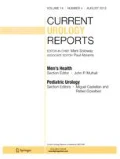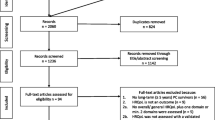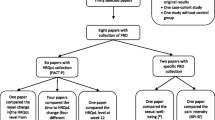Abstract
Purpose of Review
Quality of life (QoL) outcomes have been reported in the literature and incorporated in decision-making in localized prostate cancer management for decades. Until recently, there was less emphasis on understanding the QoL effects of therapies for patients with advanced disease, possibly because there were fewer options for treatment. The purpose of this review is to summarize the key recent literature describing QoL outcomes for prostate cancer treatments in different disease settings.
Recent Findings
Recent data demonstrate that men who undergo local therapy for prostate cancer have worse early QoL related to therapy in sexual, urinary, and bowel function domains compared with men who choose observation, though the effects become less divergent over time. In patients receiving systemic therapy for advanced prostate cancer, more effective treatment typically delays deterioration of various aspects of QoL as assessed by patient-reported outcomes.
Summary
While there are multiple management options for localized and advanced prostate cancer, different treatment modalities affect QoL in distinct ways. Particularly in settings that lack head-to-head efficacy data between treatment options, clinicians can incorporate adverse effect profiles and effects on patient-reported outcomes describing QoL to inform patients as they make treatment decisions for prostate cancer.
Similar content being viewed by others
References
Papers of particular interest, published recently, have been highlighted as: • Of importance •• Of major importance
U.S. Cancer Statistics Working Group. U.S. Cancer Statistics Data Visualizations Tool, based on November 2017 submission data (1999–2015): U.S. Department of Health and Human Services, Centers for Disease Control and Prevention and National Cancer Institute. www.cdc.gov/cancer/dataviz. Accessed 10 May 2019.
SEER cancer stat facts: prostate cancer. National Cancer Institute. Bethesda, MD. https://seer.cancer.gov/statfacts/html/prost.html. Accessed 11 May 2019.
Kibel AS, Ciezki JP, Klein EA, Reddy CA, Lubahn JD, Haslag-Minoff J, et al. Survival among men with clinically localized prostate cancer treated with radical prostatectomy or radiation therapy in the prostate specific antigen era. J Urol. 2012;187(4):1259–65.
Steele CB, Li J, Huang B, Weir HK. Prostate cancer survival in the United States by race and stage (2001-2009): findings from the CONCORD-2 study. Cancer. 2017;123(Suppl 24):5160–77.
Mohler JL, Antonarakis ES, Armstrong AJ, D’Amico AV, Davis BJ, Dorff T, et al. Prostate cancer, version 2.2019, NCCN clinical practice guidelines in oncology. J Natl Compr Cancer Netw. 2019;17(5):479–505.
Huggins C, Hodges CV. Studies on prostatic cancer: I. The effect of castration, of estrogen and of androgen injection on serum phosphatases in metastatic carcinoma of the prostate. 1941. J Urol. 2002;168(1):9–12.
Moses KDL, Ahmed I, Penson D, Morgans AK. Patient-identified factors affecting treatment decisions for advanced prostate cancer. Boston: American Urologic Association; 2017. p. e766.
Keating NL, O’Malley AJ, Freedland SJ, Smith MR. Diabetes and cardiovascular disease during androgen deprivation therapy: observational study of veterans with prostate cancer. J Natl Cancer Inst. 2010;102(1):39–46.
Dinh KT, Reznor G, Muralidhar V, Mahal BA, Nezolosky MD, Choueiri TK, et al. Association of androgen deprivation therapy with depression in localized prostate cancer. J Clin Oncol Off J Am Soc Clin Oncol. 2016;34(16):1905–12.
Quinten C, Maringwa J, Gotay CC, Martinelli F, Coens C, Reeve BB, et al. Patient self-reports of symptoms and clinician ratings as predictors of overall cancer survival. J Natl Cancer Inst. 2011;103(24):1851–8.
Schuurhuizen C, Marino P, Braamse AMJ, Buffart LM, Joly F, Fizazi K, et al. Impact of patient- and clinician-reported cumulative toxicity on quality of life in patients with metastatic castration-naive prostate cancer. J Natl Compr Cancer Netw. 2018;16(12):1481–8.
Mohler JL, Armstrong AJ, Antonarakis ES, Bahnson RR, D’Amico AV, Davis BJ, et al. Prostate cancer, version 2.2019: National Comprehensive Cancer Network; 2019 [Available from: https://www.nccn.org/professionals/physician_gls/pdf/prostate.pdf. Accessed 23, May 2019.
•• Donovan JL, Hamdy FC, Lane JA, Mason M, Metcalfe C, Walsh E, et al. Patient-reported outcomes after monitoring, surgery, or radiotherapy for prostate cancer. N Engl J Med. 2016;375(15):1425–37 This prospective randomized study of 1643 men illustrates the effects that the three major localized PC management strategies have on QoL. Surgery was associated with worse urinary continence and sexual function while radiotherapy was associated with worse long-term bowel function. Urinary and sexual symptoms were better in the active monitoring group initially, but gradually worsened over time with disease progression and subsequent local therapy.
Steineck G, Helgesen F, Adolfsson J, Dickman PW, Johansson JE, Norlen BJ, et al. Quality of life after radical prostatectomy or watchful waiting. N Engl J Med. 2002;347(11):790–6.
Barocas DA, Alvarez J, Resnick MJ, Koyama T, Hoffman KE, Tyson MD, et al. Association between radiation therapy, surgery, or observation for localized prostate cancer and patient-reported outcomes after 3 years. JAMA. 2017;317(11):1126–40.
Chen RC, Basak R, Meyer AM, Kuo TM, Carpenter WR, Agans RP, et al. Association between choice of radical prostatectomy, external beam radiotherapy, brachytherapy, or active surveillance and patient-reported quality of life among men with localized prostate cancer. JAMA. 2017;317(11):1141–50.
Resnick MJ, Koyama T, Fan KH, Albertsen PC, Goodman M, Hamilton AS, et al. Long-term functional outcomes after treatment for localized prostate cancer. N Engl J Med. 2013;368(5):436–45.
Szymanski KM, Wei JT, Dunn RL, Sanda MG. Development and validation of an abbreviated version of the expanded prostate cancer index composite instrument for measuring health-related quality of life among prostate cancer survivors. Urology. 2010;76(5):1245–50.
Bill-Axelson A, Holmberg L, Garmo H, Taari K, Busch C, Nordling S, et al. Radical prostatectomy or watchful waiting in prostate cancer - 29-year follow-up. N Engl J Med. 2018;379(24):2319–29.
Johansson E, Steineck G, Holmberg L, Johansson JE, Nyberg T, Bill-Axelson A. Quality of life after radical prostatectomy or watchful waiting with or without androgen deprivation therapy: the SPCG-4 randomized trial. Eur Urol Oncol. 2018;1(2):134–42.
•• Chi KN, Protheroe A, Rodriguez-Antolin A, Facchini G, Suttman H, Matsubara N, et al. Patient-reported outcomes following abiraterone acetate plus prednisone added to androgen deprivation therapy in patients with newly diagnosed metastatic castration-naive prostate cancer (LATITUDE): an international, randomised phase 3 trial. Lancet Oncol. 2018;19(2):194–206 This follow-up of LATITUDE demonstrated that in addition to improving survival outcomes in patients with mHSPC, abiraterone improved quality of life compared with placebo. Abiraterone delayed progression of pain and fatigue outcomes and delayed deterioration of QoL in men with mHSPC.
Esper P, Mo F, Chodak G, Sinner M, Cella D, Pienta KJ. Measuring quality of life in men with prostate cancer using the functional assessment of cancer therapy-prostate instrument. Urology. 1997;50(6):920–8.
• Morgans AK, Chen YH, Sweeney CJ, Jarrard DF, Plimack ER, Gartrell BA, et al. Quality of life during treatment with chemohormonal therapy: analysis of E3805 chemohormonal androgen ablation randomized trial in prostate cancer. J Clin Oncol Off J Am Soc Clin Oncol. 2018;36(11):1088–95 The QOL analysis for the phase three CHAARTED trial demonstrated that QOL was significantly poorer at 3 months in men receiving chemohormonal therapy than ADT alone, but significantly better at 12 months with chemohormonal therapy than ADT alone. These differences did not meet the threshold for clinically meaningful differences at either timepoint..
Cella D, Peterman A, Hudgens S, Webster K, Socinski MA. Measuring the side effects of taxane therapy in oncology: the functional assesment of cancer therapy-taxane (FACT-taxane). Cancer. 2003;98(4):822–31.
Yellen SB, Cella DF, Webster K, Blendowski C, Kaplan E. Measuring fatigue and other anemia-related symptoms with the functional assessment of cancer therapy (FACT) measurement system. J Pain Symptom Manag. 1997;13(2):63–74.
Hussain M, Fizazi K, Saad F, Rathenborg P, Shore N, Ferreira U, et al. Enzalutamide in men with nonmetastatic, castration-resistant prostate cancer. N Engl J Med. 2018;378(26):2465–74.
Tombal B, Saad F, Penson D, Hussain M, Sternberg CN, Morlock R, et al. Patient-reported outcomes following enzalutamide or placebo in men with non-metastatic, castration-resistant prostate cancer (PROSPER): a multicentre, randomised, double-blind, phase 3 trial. Lancet Oncol. 2019;20(4):556–69.
Smith MR, Saad F, Chowdhury S, Oudard S, Hadaschik BA, Graff JN, et al. Apalutamide treatment and metastasis-free survival in prostate cancer. N Engl J Med. 2018;378(15):1408–18.
Fizazi K, Shore N, Tammela TL, Ulys A, Vjaters E, Polyakov S, et al. Darolutamide in nonmetastatic, castration-resistant prostate cancer. N Engl J Med. 2019;380(13):1235–46.
Parker C, Nilsson S, Heinrich D, Helle SI, O’Sullivan JM, Fossa SD, et al. Alpha emitter radium-223 and survival in metastatic prostate cancer. N Engl J Med. 2013;369(3):213–23.
Nilsson S, Cislo P, Sartor O, Vogelzang NJ, Coleman RE, O’Sullivan JM, et al. Patient-reported quality-of-life analysis of radium-223 dichloride from the phase III ALSYMPCA study. Ann Oncol. 2016;27(5):868–74.
Scher HI, Fizazi K, Saad F, Taplin ME, Sternberg CN, Miller K, et al. Increased survival with enzalutamide in prostate cancer after chemotherapy. N Engl J Med. 2012;367(13):1187–97.
Beer TM, Armstrong AJ, Rathkopf DE, Loriot Y, Sternberg CN, Higano CS, et al. Enzalutamide in metastatic prostate cancer before chemotherapy. N Engl J Med. 2014;371(5):424–33.
de Bono JS, Logothetis CJ, Molina A, Fizazi K, North S, Chu L, et al. Abiraterone and increased survival in metastatic prostate cancer. N Engl J Med. 2011;364(21):1995–2005.
Ryan CJ, Smith MR, de Bono JS, Molina A, Logothetis CJ, de Souza P, et al. Abiraterone in metastatic prostate cancer without previous chemotherapy. N Engl J Med. 2013;368(2):138–48.
•• Khalaf DJ, Sunderland K, Eigl BJ, Kollmannsberger CK, Ivanov N, Finch DL, et al. Health-related quality of life for abiraterone plus prednisone versus enzalutamide in patients with metastatic castration-resistant prostate cancer: results from a phase II randomized trial. Eur Urol. 2019 Jun;75(6):940-947 This is the first head-to-head prospective study comparing enzalutamide and abiraterone and their effects on PROs. Among patients 75 years and older, abiraterone was associated with better FACT-P scores. Among all patients, enzalutamide was associated with worse functional and physical well-being and worse PHQ-9 scores.
Oudard S, Fizazi K, Sengelov L, Daugaard G, Saad F, Hansen S, et al. Cabazitaxel versus docetaxel as first-line therapy for patients with metastatic castration-resistant prostate cancer: a randomized phase III trial-FIRSTANA. J Clin Oncol Off J Am Soc Clin Oncol. 2017;35(28):3189–97.
Author information
Authors and Affiliations
Corresponding author
Ethics declarations
Conflict of Interest
Jeffrey Shevach and Adam Weiner each declare no potential conflicts of interest. Alicia K. Morgans reports personal fees from Astellas, Bayer, Sanofi, Genentech, AstraZeneca, and Janssen and a research grant from Bayer.
Human and Animal Rights and Informed Consent
This article does not contain any studies with human or animal subjects performed by any of the authors.
Additional information
Publisher’s Note
Springer Nature remains neutral with regard to jurisdictional claims in published maps and institutional affiliations.
This article is part of the Topical Collection on Prostate Cancer
Rights and permissions
About this article
Cite this article
Shevach, J., Weiner, A. & Morgans, A.K. Quality of Life–Focused Decision-Making for Prostate Cancer. Curr Urol Rep 20, 57 (2019). https://doi.org/10.1007/s11934-019-0924-2
Published:
DOI: https://doi.org/10.1007/s11934-019-0924-2




